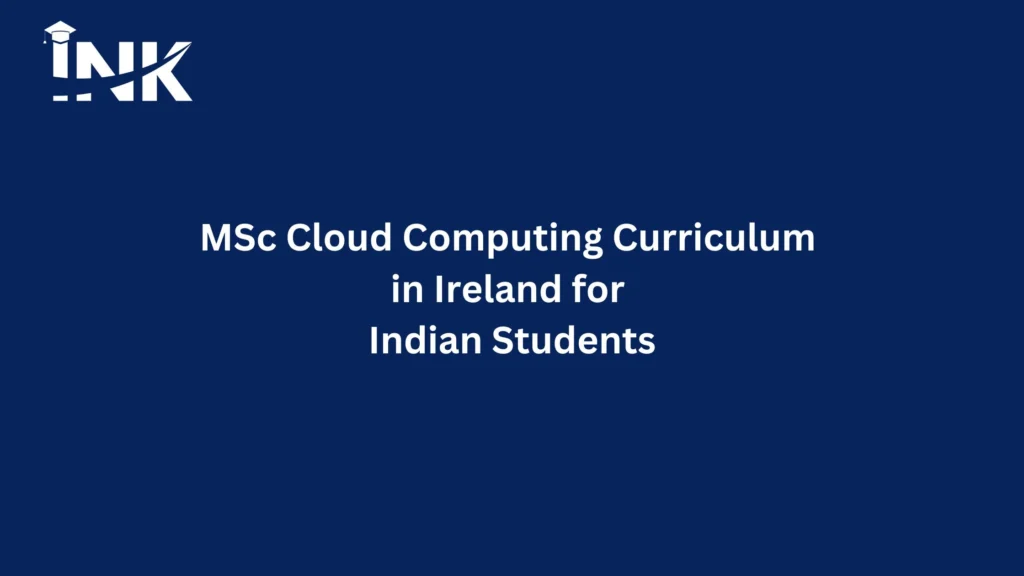
An MSc in Cloud Computing curriculum in Ireland typically includes core subjects such as cloud architecture, cloud security, virtualization technologies, data analytics, and distributed systems.
The program focuses on designing scalable cloud solutions, implementing robust security measures, and managing large-scale data. Students benefit from hands-on labs, capstone projects, and opportunities for industry certifications. Elective courses enable specialization in areas like AI, IoT, DevOps, and advanced networking.
MSc in Computing programs in Ireland consist of core modules, optional modules, and research projects. These programs also include professional and research practice modules.
Research Projects
Professional and Research Practice Modules
An MSc in Computing (Cloud Computing) curriculum in Ireland typically covers fundamental topics such as cloud architecture, cloud security, virtualization technologies, data analytics, and distributed systems.
The program emphasizes designing scalable cloud solutions, implementing robust security measures, and managing large-scale data. Students can also choose elective courses to specialize in areas such as Artificial Intelligence, IoT, DevOps, and advanced networking.
Key Components of an MSc in Computing (Cloud Computing) Curriculum in Ireland
Cloud Fundamentals:
Cloud Infrastructure and Management:
Cloud Security:
Cloud Application Development:
Data Analytics and Big Data in the Cloud:
Cloud Provider Specifics:
Potential Elective Courses:
The Master of Science in Cloud Native Computing is an advanced 90 ECTS program designed for IT professionals seeking specialized expertise in Software Design with Cloud Native Computing.
This program includes 12 contact hours per week, with an additional 12 hours of self-directed learning required. It also features a work placement or an industry-focused dissertation, allowing students to apply theoretical knowledge in real-world settings.
Modules
Get personalized guidance on applications, scholarships, and visa processes.
or
Call + 91 8754750019 now
An MBA in Cloud Computing curriculum in Ireland is designed to explore the business applications of cloud technology. The program covers key areas such as cloud service providers (AWS, Azure, GCP), cloud architecture design, data management in the cloud, cloud security, cost optimization, business case development for cloud migration, and the strategic impact of cloud adoption within organizations. A strong focus is placed on practical applications and industry-relevant case studies. One of the top institutions offering this program is Dublin Business School.
Key Components of an MBA in Cloud Computing Curriculum in Ireland
Cloud Fundamentals:
Business Applications of Cloud Computing:
Cloud Security and Compliance:
Cloud Management and Governance:
Business Strategy and Cloud Adoption:
Industry Case Studies and Projects:
Important Considerations
An MSc in Cloud Technologies curriculum in Ireland typically covers fundamental areas such as cloud architecture, cloud security, virtualization technologies, data analytics, and distributed systems. The program focuses on designing scalable cloud solutions, implementing robust security measures, and managing large-scale data.
Students gain practical experience through hands-on labs, capstone projects, and industry certifications, with opportunities to specialize in areas like AI, IoT, DevOps, and advanced networking through elective courses.
Key Components of an MSc in Cloud Technologies Curriculum in Ireland
Cloud Fundamentals:
Cloud Security:
Cloud Infrastructure Management:
Cloud Data Analytics:
Cloud Application Development:
Cloud-Specific Platforms:
Elective Courses (Depending on the Program):
Our experts will assist you with SOPs, LORs, and fulfilling all requirements for your conditional offer letter.
or
Call + 91 8754750019 now
Curriculum in Ireland:
MSc in Cloud Computing Research
Curriculum in Ireland:
Yes, with global tech companies based there, cloud computing professionals are in high demand.
Ireland is a top destination for cloud computing careers, with major tech companies and a growing demand for skilled professionals.
Earn a degree in IT or cloud computing, gain certifications (AWS, Azure), and build hands-on experience.
Key modules: Machine Learning, Data Analytics, and Data Visualization.
A bachelor’s degree in computer science or a related field is typically required.
© 2024 INK Abroad All rights reserved. Website and Digital Marketing handled by Radian Points